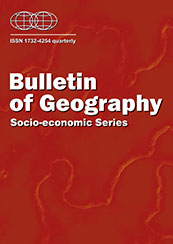Stakeholders in the local service centre: who should be involved in the planning process? Insights from Poland, Czech Republic and Denmark
DOI:
https://doi.org/10.2478/bog-2019-0006Keywords
local service centre, neighbourhood, stakeholders, urban planning, citizen participationAbstract
Local service centres play a vital role in shaping the quality of life in urban neighbourhoods. They offer access to essential everyday services (shops, education, healthcare, personal services) and to public spaces. If they are properly planned and managed, they can bring particular added values to the local community, such as social integration and territorial identification. The history of urban planning has produced several patterns of local service centres (ancient agora, medieval market square, neighbourhood unit, modern agora) but today a question arises: how can a local service centre be successfully planned and organised in post-modern political practice? How to realise its potential and to meet the ever-changing needs, expectations and preferences of local communities? Who should be involved in those processes? To answer those questions in this paper we refer to citizen participation and public communication concepts, where selecting the appropriate stakeholders emerges as a necessary starting point for effective urban governance. We present the results of in-depth interviews with local actors (local authorities, municipality officials, town planners, non-governmental organisations, local leaders) in Poland (Wrocław, Siechnice, Ostrów Wielkopolski, Warszawa and Zabierzów), Czech Republic (Prague) and Denmark (Copenhagen). Depending on the specific local context, various stakeholders are perceived as essential to the decision-making process. The power relations and problems encountered in public policy implementation in particular locations have been summarized in 3 sections: relationships between stakeholders, leadership and good practices. The paper concludes with a list of typical actors who should be involved in planning, building and managing a local service centre in urbanized neighbourhoods.
References
Belof M. (2013). Teoria a praktyka planowania regionalnego: doświadczenia polskie w planowaniu przestrzennym po 1998 r. Wrocław: Oficyna Wydawnicza Politechniki Wrocławskiej.
Bourne, L. (2005). Project Relationship Management and the Stakeholder Circle (PhD Thesis). RMIT University, AU.
Carmona M., De Magalhaes C., Edwards M (2010), Stakeholder Views on Value and Urban Design. Journal of Urban Design 7 (2): 145-169
City of Stuttgart, Economic Development Department (2011). Manual for District Centre Managers. Results of the Project MANDIE – Managing District Centres in Northwest Europe.
Czapiński J. (2015). Stan społeczeństwa obywatelskiego, in J. Czapiński, T. Panek (Eds.), DIAGNOZA SPOŁECZNA 2015. Warunki i jakość życia Polaków. Raport. Warszawa: Rada Monitoringu Społecznego. 2015, p. 332-372.
Damurski Ł. (2015). From Formal to Semi-formal and Informal Communication in Urban Planning. Insights from Polish Municipalities, European Planning Studies, DOI: 10.1080/09654313.2014.993935
Damurski Ł., Ładysz J., Pluta J., Mayer-Wydra M., Zipser W. (2017). Lokalne centrum usługowe: w poszukiwaniu formy i funkcji. Przestrzeń społeczna / Social Space Journal. Nr 3/2017(15)s. 1-27.
Flyvbjerg B. (1998). Rationality and power: democracy in practice. The University of Chicago Press. Chicago.
Hawkins R. L., Maurer K. (2010). Bonding, Bridging and Linking: How Social Capital Operated in New Orleans following Hurricane Katrina. British Journal of Social Work (2010) 40, 1777–1793. doi:10.1093/bjsw/bcp087
Healey P. (1992), Planning through debate: the communicative turn in planning theory. Town Planing Review 63 (2)
Heffner K., Gibas P. (2013). Delimitacja przestrzenna obszarów wiejskich o słabym dostępie do usług publicznych w województwie lubuskim. Zielona Góra.
Gehl, J. (2009). Życie między budynkami: użytkowanie przestrzeni publicznych. Tłum. M. A. Urbańska. Kraków: Wydawnictwo RAM.
Innes J., Booher D. (2010). Planning with Complexity. An Introduction to Collaborative Rationality for Public Policy. New York: Routledge.
Jałowiecki B., Szczepański M. S., 2002: Miasto i przestrzeń w perspektywie socjologicznej, Warszawa: Wydawnictwo Naukowe "Scholar".
Kowicki M. (2004). Współczesna agora. Wybrane problemy kształtowania ośrodków usługowych dla małych społeczności lokalnych, Politechnika Krakowska, Kraków.
Maier K. (2018), Planning between transitions: Czech experience. Manuscript for Raumforschung und Raumordnung. ARL
Mitchell, R.K., Agle, B.R., Wood, D.J., 1997. Toward a theory of stakeholder identification and salience: defining the principle of who and what really counts. Acad. Manage. Rev. 22 (4), 853–887.
MMR (2016), Standardy dostupnosti veřejné infrastruktury [Accessibility Standards for public infrastructure]. http://www.uur.cz/images/8-stanoviska-a-metodiky/53-TB050MMR01-Standardy-dostupnosti-verejne-infrastruktury-2017-10-30.pdf
Narang, S., Reutersward, L. (2006). Improved governance and sustainable urban development. Strategic planning holds the key, European Journal of Spatial Development, April 2006, p. 1-11.
Pawłowska, K. (2008) Przeciwdziałanie konfliktom wokół ochrony i kształtowania krajobrazu. Partycypacja społeczna, debata publiczna, negocjacje. [Preventing conflicts around conservation and landscape development. Social participation, public debate, negotiation] (Kraków: Politechnika Krakowska im T. Kościuszki).
Perry, C. (1998). The Neighbourhood Unit, a Scheme for Arrangement for the Family-Life Community (1929). Reprinted Routledge/Thoemmes, London
Project Management Institute (2013). A Guide to the Project Management Body of Knowledge, Fifth Edition, Newtown Square, PA, USA: Project Management Institute.
Putnam, R. (2000). Bowling Alone: The Collapse and Revival of American Community, New York, Simon & Schuster.
Studium uwarunkowań i kierunków zagospodarowania przestrzennego Wrocławia przyjęte uchwałą nr L/1177/18 Rady Miejskiej Wrocławia z dnia 11 stycznia lipca 2018 r. Kierunki zagospodarowania przestrzennego: struktura funkcjonalno-przestrzenna. Biuro Rozwoju Wrocławia 2018.
Szreter, S. and Woolcock, M. (2004). Health by association? Social capital, social theory, and the political economy of public health, International Journal of Epidemiology, 33(4), pp. 650 – 67.
Territorial Agenda of the European Union 2020. Towards an Inclusive, Smart and Sustainable Europe of Diverse Regions. Agreed at the Informal Ministerial Meeting of Ministers responsible for Spatial Planning and Territorial Development on 19th May 2011 Gödöllő, Hungary.
The Planning Academy (2013). Key stakeholders in the planning system, http://theplanningacademy.com.au/key-stakeholders-in-the-planning-system (29/09/2018).
Yang R. J. (2014). An investigation of stakeholder analysis in urban development projects: Empirical or rationalistic perspectives. International Journal of Project Management 32 (2014) 838–849.
Downloads
Published
How to Cite
Issue
Section
License
Copyright (c) 2019 Bulletin of Geography. Socio-economic Series

This work is licensed under a Creative Commons Attribution-NoDerivatives 4.0 International License.
Title, logo and layout of journal Bulletin of Geography. Socio-economic Series are reserved trademarks of Bulletin of Geography. Socio-economic Series.Stats
Number of views and downloads: 681
Number of citations: 3



